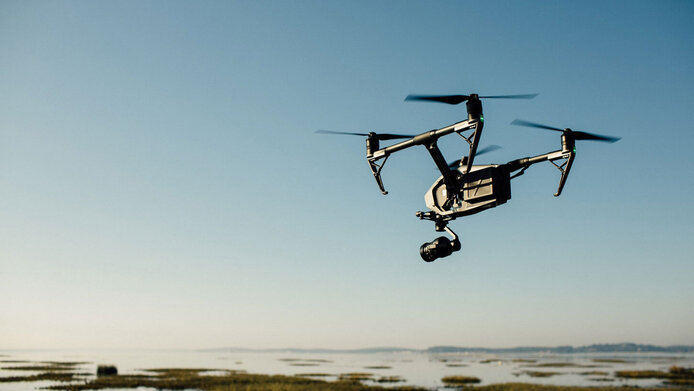At the edge of the cloud

Twenty years ago, hardly anyone would have predicted that we would master our everyday lives simply by carrying small computers in our pockets, and that we would even be able to talk to such devices. In much the same vein, many people are still unaware today that this is just the beginning: “It will be only in the next few years that we will see the true emergence of omnipresent systems that are increasingly interwoven with the fabric of our society,” says Christos Tsigkanos, a computer scientist who is conducting research on “composite spaces” between the physical world and the digitally computed world.
In the future, we will probably not even have to communicate our intentions to a computer, Tsigkanos notes, because computing power will anticipate movements and needs in real time. This may apply to automated processes in factories, simple everyday things like lighting or heating that are only switched on when someone needs them, or vehicles that not only organise themselves with the help of a digital dimension which we are not even aware of ourselves but can also move autonomously through a city or through disaster-hit areas. These are complex systems that are all interconnected.
The only constant is change
Constant change, only some of it predictable, constitutes the special challenge at this interface between the physical and the digital sphere. This change is brought about by human actions, weather trends, sudden exceptional events and many more factors. So the only certainty is that there will be change. “In computer science, we call that dynamics, and we have to take it into account when designing any such system,” explains Tsigkanos.
Tsigkanos calls his related research project Edenspace. While it does not promise the Garden of Eden, it does aim at a world in which helpful technologies fulfil their tasks, and above all fulfil them reliably. “We use a mathematics-based approach and rely on so-called formal methods, which are excellently suited to verifying whether systems work correctly,” says Tsigkanos. His goal is to provide a stable model for such distributed systems that involve data, processing and users that may well be not in the same place and often moving about.
Better bike sharing
Bike sharing systems are a simple example of a distributed system between physical and digital space. Bicycles have a few sensors and information about location and users, but not a great deal of computing power. Hence, the sensor information has to be transmitted somehow. According to Tsigkanos, the data cannot be sent directly to a central location – even if that location is the digital cloud – because that would be too expensive and time-consuming. Instead, the system uses so-called edge computing, which means a computing system that lies between the cloud and the end devices and provides a computing infrastructure for the bicycle. When the bicycle approaches an edge device, it shares and receives information. In this way, data is transmitted faster than if everything had to be sent to and from a central point.
The more requests edge devices receive, however, the more difficult the proper coordination of the demands on computing power, data transmission and network communication becomes, while simultaneously ensuring that all parts of the system function properly. That is necessary nevertheless to be able to rely on the results – and that is the field on which Tsigkanos’ research focuses. If the system notices, for instance, that some data is delayed or does not tally with other data, it should send an alert that the system is not working properly at that particular moment rather than making wrong predictions.
If one extrapolates the possibilities just for bike sharing systems, one could integrate information about events or the weather in order to make reliable predictions about where bicycles will be needed next. Through a discount or bonus point system, users could be encouraged to park their bicycles closer to these locations. Self-driving cars could head there themselves. But if the system were prone to errors that would not be helpful at all, and vehicles would end up in the wrong place.
A reliable future world
On the other hand, if the distributed systems are indeed reliable, they could coordinate aid much more efficiently in real time in disaster areas, for example, without relying on a central data connection. Drones could collect data and pass it on to ambulances or commercial vehicles on the ground so as to get relief supplies and emergency response teams to where they are most needed as quickly as possible – or get them out of harm's way in a timely fashion.
“You need to plan in advance just how such data flows can be coordinated and aligned – you can't do that with a system that's up and running. Dynamics have to be taken into account in both the design and the operation of the system,” says Tsigkanos. Regardless of whether the aim is to save human lives or correctly assess where bicycles are needed, the challenge in designing such systems so as to be reliable remains comparable. The model of Tsigkanos offers a way to build systems that either reliably meet the demands made on them or even adapt themselves whenever they don't.
Personal details
Christos Tsigkanos studied computer science in Athens and Amsterdam and obtained his doctorate in Milan in 2017, followed by research spells in Vienna and Berne. In the near future, Tsigkanos will be taking up a professorship in Athens. In his research, he is interested in critical systems and methods for developing reliable software systems. The Lise-Meitner project Edenspace: Engineering Dependable Cyber-Physical Spaces received roughly EUR 173,000 in funding from the Austrian Science Fund FWF and was completed in January 2022.
Publications
Tsigkanos C., Bersani M., Frangoudis P., S. Dustdar S.: Edge-based Runtime Verification for the Internet of Things, in: IEEE Transactions on Services Computing, Vol. 15, 2022
Avasalcai C., Tsigkanos C., Dustdar S.: Resource Management for Latency-Sensitive IoT Applications with Satisfiability, in: IEEE Transactions on Services Computing Vol. 15, 2022
Tsigkanos C., Li N., Hu Z., Jin Z., Ghezzi C.: Scalable Multiple-View Analysis of Reactive Systems via Bidirectional Model Transformations, in: IEEE/ACM Automated Software Engineering (ASE), 2020 – ACM SIGSOFT Distinguished Paper Award





